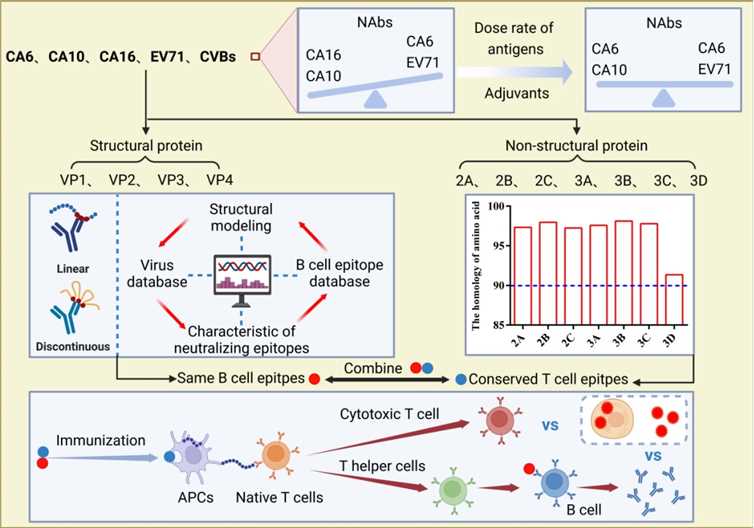Research-Grade Vaccine Discovery Services for Infectious Disease Research
Creative Biolabs provides specialized research-grade vaccine discovery services for infectious disease research to advance research on the prevention and control of infectious diseases.
Research Grade Vaccine Discovery Workflow
-
Finalize the vaccine discovery planning. According to the requirements, a detailed vaccine discovery plan including selection of target pathogens, identification of vaccine types, and development of a research program is established.
-
Pathogen characterization and antigen selection. Conduct a comprehensive analysis of the target pathogens to understand their characteristics, transmission routes, and mutations in order to identify the pathogens (viruses, bacteria, parasites, etc.) that cause infectious diseases.
-
Vaccine design and optimization. On the basis of the results of pathogen analysis, we would design and optimize vaccine candidates, including the selection of appropriate antigens, adjuvants, and immunostimulants. These antigens can then be prepared using genetic engineering techniques, protein purification techniques, etc.
-
Prototype vaccine preparation and testing. We then formulate a prototype vaccine and conduct ex vivo and in vivo testing to evaluate its immunogenicity, stability, toxicological properties, etc. to ensure the quality and viability of the prototype vaccine.
-
Production process development and optimization. We develop and optimize the production process of antigens based on the results of immunogenicity tests and animal protection tests to improve the yield and quality of antigens.
-
Preclinical research support. Provide research support including in vivo animal experiments, cell culture and immunological testing to evaluate the immunogenicity, safety and efficacy of the vaccine.
-
Data analysis and interpretation. Data analysis experts will statistically analyze and interpret research data to provide you with accurate results and scientific advice.
 Fig. 1 Optimization strategies for the development of multivalent HFMD vaccines.1
Fig. 1 Optimization strategies for the development of multivalent HFMD vaccines.1
Multiple Types of Vaccine Discovery for Infectious Disease Research at Creative Biolabs
DNA Vaccine Discovery
-
DNA vaccines are based on DNA technology, in which DNA fragments (i.e., gene sequences) encoding viral antigens are inserted into a plasmid, which is then injected into the organism.
-
DNA vaccines have the advantage of being easy to produce, store, and transport. However, DNA vaccines may not immunize as strongly as other types of vaccines.
mRNA Vaccine Discovery
-
mRNA vaccines are designed to inject mRNA fragments encoding viral antigens into the system, and the body's cells read these instructions and produce viral antigens.
-
mRNA vaccines offer the advantages of rapid production and can be rapidly developed against a wide range of viruses.
Polypeptide Vaccine Discovery
-
Polypeptide vaccines are made using synthetic peptide technology, in which synthetic short-chain peptides (protein fragments) are injected into the body that mimic the characteristics of viral antigens, thereby triggering an immune response.
-
Peptide vaccines can often be customized to prevent cancer and autoimmune diseases.
Recombinant Protein Vaccine Discovery
-
Recombinant protein vaccines are discovered by using genetic engineering techniques to insert genes encoding viral antigens into bacteria or yeast, which produce large amounts of viral antigenic proteins to induce an immune response in recipients.
-
Recombinant antigenic proteins that have been enriched or even modified are highly immunogenic, while the production process is mature, but it is not easy to post-translationally modify the recombinant protein vaccine, and the amount of expression is low, which makes the subsequent purification difficult.
Viral Vector Vaccine Discovery
-
Viral vector vaccines utilize attenuated or inactivated viruses as vectors to deliver genes encoding viral antigens. This vector virus enters the cell and delivers the antigenic gene, triggering immunity.
-
Viral vector vaccines offer the advantage of inducing a strong immune response, yet the vector virus may cause adverse reactions.
Creative Biolabs is dedicated to providing high-quality, research-grade vaccine discovery services to clients in a variety of fields to accelerate the dissemination of vaccines in infectious disease research. Please contact us if you would like to know more.
Reference:
-
Zhang, Xinglong, et al. "Hand-Foot-and-Mouth Disease-associated enterovirus and the development of multivalent HFMD Vaccines." International Journal of Molecular Sciences 24.1 (2022): 169.
For Research Use Only. We do not provide direct services or products for patients.
Related Services:
 Fig. 1 Optimization strategies for the development of multivalent HFMD vaccines.1
Fig. 1 Optimization strategies for the development of multivalent HFMD vaccines.1